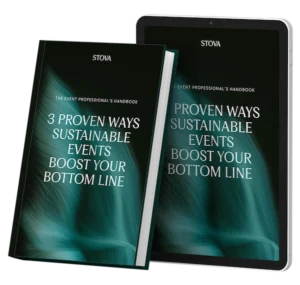8 Finance Event Activations that Spur Creativity and Innovation
July 17, 2025

In an industry driven by data, regulation, and risk mitigation, creativity might not be the first word that comes to mind when thinking about finance. But the innovation behind fintech disruption, new investment models, and evolving client expectations depends on it. For senior finance event professionals, creating spaces where fresh ideas can take root and cross-pollinate is more than a nice-to-have – it’s essential.
Events remain one of the few environments where strategic connections, immersive learning experiences and collaborative opportunities can spark the kind of creativity that leads to real competitive advantage. Whether you’re designing a global summit or an accelerator-friendly showcase, these types of activations give both established institutions and upstart disruptors a place to think differently, test boldly, and build meaningful relationships.
Here are eight event activations that foster creativity and innovation in finance and fintech.
1. Hackathons Focused on Payments, AI or Blockchain
Fintech hackathons are intensive team-based challenges where participants collaborate to create working prototypes of solutions to real-world problems, sometimes within a 24- to 72-hour window. At the end of the hackathon, teams present what they came up with, often to compete for prizes, recognition, etc.
The goal is not to develop a fully-realized solution, but rather to connect diverse talents with multiple perspectives around a real problem to test and develop ideas. By engaging developers, analysts, product managers and designers, they unlock bottom-up creativity that rarely emerges in environments where the onus is often on senior product managers to ideate solutions.
Pro Tips:
Have sponsoring companies provide open access to tools, solutions, API documentation or 10-minute sense-checks. Participants should be encouraged to create clear, real-world challenge statements and some basic onboarding with best practices and guidelines. Also, ensure that IP ownership is clear upfront to avoid legal headaches later.
2. Competitions with Cash Prizes, Prestige, or Accelerator Entry
While hackathons are effective drivers of engagement, they can be time-prohibitive for shorter events. Fortunately, innovators in already-assembled teams can also benefit from a way to showcase their own solutions – and these tend to be more fleshed out. Any structured contest that invites individuals or teams to pitch ideas, solutions or strategic models in front of a panel of judges can help to establish such a platform. Winners might receive funding, fast-tracked entry into a fintech accelerator or exposure to VCs.
Competitions work because they attract a diverse cross-section of talent and encourage bold thinking, and can be tailored to the audience. For example, VCs looking for fresh talent might be interested in student fintech challenges, whereas established awards programs by industry media outlets might be more interested in new product showcases.
An alternative format that encourages the audience to feel invested involves letting them vote in real-time to select a winner. For start-ups, it’s a visibility boost; for attendees, it’s a rare chance to shape the conversation and spot emerging trends.
Pro Tips:
Competitions are a rare opportunity for participants at various industry strata to meet and mingle, and are well-served by coordinated networking sessions.
Set clear rules and eligibility criteria to avoid disputes or confusion later, and design the application process to reinforce them. Stova’s robust registration solution allows for dynamic forms that serve participants the fields they need based on whether they’re registering as a competitor, a judge or an attendee.
Digital platforms like Stova’s mobile event app can be used for transparent scoring, whether judges want to take and compare notes privately or open voting up to the audience.
3. 10-Minute Visionary Series (Finance TEDs)
TED Talks became famous for their curated series of short, high-impact talks from diverse voices across a broad spectrum of topics. Talks of this type are a great way for a finance event to highlight not only new solutions, but new voices, ideas and philosophies in finance, technology, regulation and entrepreneurship. Give each speaker a tight 10-minute slot to share a bold idea or compelling story, and offer a networking intermission every three to four talks.
This format respects the audience’s time while providing concentrated insight. It helps surface ideas from people who might not land a full keynote and supports narrative-based learning over dense data dumps.
Pro Tips:
Don’t just book big names. Feature contrarians, rising stars or innovators from within and outside finance. These talks are also perfect for post-event marketing. Record them for streaming on demand using your virtual event platform, and chop them up into neat soundbites to extend visibility on social media.
4. SMB Workshops on Funding, Grants and Scaling
Founders of small- and medium-sized business (SMB) often lack access to professional mentorship on critical business operations. Whether an SMB is proudly bootstrapped or trying to establish enough momentum to gain the interest of investors, founders can benefit from practical, hands-on workshops that guide them through key growth challenges: applying for grants, courting investors, building a regulatory roadmap or preparing for a higher volume sales pipeline.
These sessions work by offering the education that innovators need to bridge the gap between ambition and execution. Within a finance event context, they also serve as important revenue generators. While you can charge participants (the founders) for the high value content, these sessions can also be extremely valuable sponsorship opportunities that create stickier consultative relationships than sponsors or institutions might get from a simple booth or lecture-style content sessions.
Pro Tips:
Workshops should be focused on delivering actionable advice on topics that attendees prioritize. To help understand those priorities and exactly what participants need help with, try canvassing prospective registrants on social media and early registrants through the registration platform or in follow-up emails.
Consider extending the value for sponsors and participants through follow-up office hours or digital toolkits.
5. Reverse Pitch Sessions with Regulators or Compliance Leaders
Flipping the script, instead of start-ups pitching to funders or partners, regulators and compliance leaders take the stage to outline upcoming industry challenges or policy shifts they’d like innovators to help address.
The format changes the normal power dynamic and frames less exciting challenges, like regulation, as innovation drivers rather than constraints. It also helps start-ups design solutions that are forward-compatible with changing legal frameworks, and for which there is a ready market.
Pro Tips:
Involve a neutral facilitator who can help frame the “asks” in accessible language. These sessions are also great in combination with other activations, like hackathons, roundtables or breakout groups where the audience can discuss ideas in depth.
6. Sector Mash-Up Networking Sessions
Set up intentional networking zones or sessions that bring together fintech professionals with adjacent industries, such as healthcare, sustainability, logistics or government, around specific topics of mutual interest. These mash-ups work because they spark cross-sector conversations and collaborative opportunities that may not emerge within siloed conversations. They’re not only a good chance for stakeholders from different (but related) areas to meet and share perspectives, but a powerful precursor to potential partnerships.
Pro Tips:
Consider asking thoughtful questions during the registration process or prompting participants to fill out fields in their attendee profiles on the mobile event app or virtual event platform that indicate their goals and interests. Using this data, Stova’s matchmaking algorithms can recommend more meaningful, productive connections.
You can even incorporate the data into an event game that helps attendees break the ice by, for example, allotting points for every contact made outside an attendee’s own declared industry.
7. “Epic Fails” Peer-Led Storytelling Sessions
Vulnerability is powerful. While the notion that you should learn from your failures is now a professional truism, many people – especially in leadership positions – find it harder to be vulnerable in sharing these learnings with others. These honest, informal sessions would allow founders, executives or product leaders to share real-world failures, from fundraising flops to product-market mismatches, to the benefit of the wider community.
These stories often resonate more than polished case studies, and they create a psychologically safe space for open dialogue. In risk-averse industries like finance, normalizing failure is crucial for an individual’s professional progress.
Pro Tips:
Create ground rules for confidentiality and respect, and record only with speaker consent. Stova’s virtual event platform allows organizers to make content available on demand, and to set user-based permissions to define who can view it.
8. Innovation Zones with Prototype Debuts
Rather than a dedicated time-slot, these zones offer a dedicated space on the show floor where selected fintech start-ups can exhibit at a hefty discount on one condition: they must launch a new product, feature or prototype during the event.
This not only gives those with new solutions an important opportunity to create buzz around their development, it improves engagement by turning passive demos into must-see moments. It also lets event organizers position themselves as champions of next-gen technology, attracting both media attention and investor interest.
Pro tips:
Require applicants to pre-submit a launch plan. Use event tech to trigger push notifications when new demos begin, and consider livestreaming key launches. You can even package an overview of the new launches into a downloadable asset owned by your event brand.
Conclusion
Creativity and innovation in finance are sparked by the unexpected connections, shared challenges and inspired moments that only live events can provide. By designing experiences that foster curiosity and collaboration, senior event professionals can make their events transformative and inspirational for those in an industry who are ready to create new solutions.
Find out how Stova can help you drive innovation within your industry. Book a demo.
Whether your event is virtual, hybrid, or in-person, enhance your attendee’s journey with an event ecosystem built for your audience. Ready to walk through Stova's event technology solutions? Schedule some time with us today.


